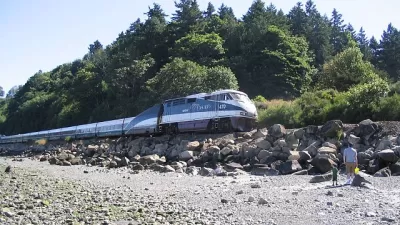A decade after Congress set a deadline for rail systems to implement positive train control, only 4 rail systems were able to get the job done on time.

"Only four of the nation's 41 rail systems required to implement lifesaving technology to prevent train accidents met Monday's deadline," reports Gregory Wallace. "The others -- including Amtrak -- have either applied for or been granted extensions of the deadline."
The lifesaving technology, called positive train control, is part of the conversation almost every time a collision or a derailment incurs loss of life or property, most recently after an Amtrak derailment in South Carolina in February 2018, and only a few months prior in Washington State.
Wallace cites National Transportation Safety Board Chairman Robert Sumwalt as an expert source in the article. In Hiatt's paraphrased opinion, "Congress, railroads and federal regulators share the blame for the missed deadline."
"In 2008 [via the Rail Safety Improvement Act], Congress set a 2015 deadline for implementing the technology, then extended it until 2018 and required federal regulators to approve extensions until 2020 for railroads that demonstrate progress toward implementing positive train control," adds Wallace.
FULL STORY: Most US rail systems miss safety deadline

Maui's Vacation Rental Debate Turns Ugly
Verbal attacks, misinformation campaigns and fistfights plague a high-stakes debate to convert thousands of vacation rentals into long-term housing.

Planetizen Federal Action Tracker
A weekly monitor of how Trump’s orders and actions are impacting planners and planning in America.

San Francisco Suspends Traffic Calming Amidst Record Deaths
Citing “a challenging fiscal landscape,” the city will cease the program on the heels of 42 traffic deaths, including 24 pedestrians.

Defunct Pittsburgh Power Plant to Become Residential Tower
A decommissioned steam heat plant will be redeveloped into almost 100 affordable housing units.

Trump Prompts Restructuring of Transportation Research Board in “Unprecedented Overreach”
The TRB has eliminated more than half of its committees including those focused on climate, equity, and cities.

Amtrak Rolls Out New Orleans to Alabama “Mardi Gras” Train
The new service will operate morning and evening departures between Mobile and New Orleans.
Urban Design for Planners 1: Software Tools
This six-course series explores essential urban design concepts using open source software and equips planners with the tools they need to participate fully in the urban design process.
Planning for Universal Design
Learn the tools for implementing Universal Design in planning regulations.
Heyer Gruel & Associates PA
JM Goldson LLC
Custer County Colorado
City of Camden Redevelopment Agency
City of Astoria
Transportation Research & Education Center (TREC) at Portland State University
Jefferson Parish Government
Camden Redevelopment Agency
City of Claremont



























